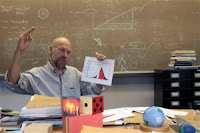We sometimes ask if we are using our time right, spending too much time on the legal front? After all, the end game begins only when we achieve an across-the-board transparent (thank you, Pope Francis, for recognizing that!) carbon fee. Focus on a carbon fee is high priority because of the danger that Paris agreements may amount to little more than national “goals” and, what’s worse, more effete ineffectual “cap-and-trade” shenanigans. A focus on science is also needed, as there is still no widespread recognition of the urgency of emission reductions, and better understanding of the science is required to achieve a good strategy to restore energy balance.
The legal approach complements recognition of the moral dimensions of climate change. Can you imagine civil rights advancing without help of the courts? Yet courts will not likely move, and they did not move in the case of civil rights, until the public recognizes the moral dimension and begins to demand action. So it is also essential to get the public more widely involved.
When a judge issues a ruling it has certain gravity. It seems that courts retain more respect with the public than legislatures do. So it is wonderful to report two important legal victories this week. Both are due to remarkably capable, determined individuals, who simply will not give up.
First, the Dutch case. The Netherlands, which will cease to exist within a century or so if the world stays on its present carbon path, is an appropriate place for the first European case in which citizens attempt to hold a state responsible for its inaction in the face of clear danger. The Dutch district court in the Hague ruled for the plaintiff, Urgenda, an environmental organization. The court ordered the Dutch government to reduce emissions 25% by 2020, a stiff order. The hero behind the scenes was lawyer, legal scholar, and author Roger Cox, who has relentlessly pursued this action for the past several years on behalf of young people and future generations.
In Seattle, the King County Superior Court Judge ordered the State to reconsider the petition of eight youth, who brought their case with the help of Our Children’s Trust, requesting that the state reduce emissions consistent with dictates of the best available science. The latter was provided in testimony to the court by Pushker Kharecha, Deputy Director of CSAS, based on our paper in PLOS One, which was not disputed by Washington State, and which calls for a reduction of emissions by 6% per year. The relentless behind-the-scenes champions in this case are Julia Olson (director of Our Children’s Trust) and legal scholar Mary Woods.
Read more at On the Legal Front - by James Hansen


No comments:
Post a Comment